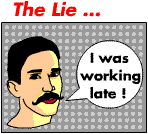Lying
Created | Updated Jan 28, 2002

Few things in life have the potential of being as useful or as dangerous as lying. Simply defined, lying is not telling the truth, but it is so much more. After all, if we symbolize the truth with the letter 'A', we could symbolize a lie not only as 'Z', but also 'B', 'C' and 'Q', among others. This is all, of course, assuming that we can define truth at all. Lying should also be differentiated from tact; lying is about truth, not opinions.
The Keys to Successful Lying
There are two points to keep in mind when one is attempting to lie:
A bad liar is just embarrassing, whereas a good liar can be quite entertaining (particularly when you are in the know about the truth).
The best lies are usually incredibly simple or terribly complex.
Simple lies are easiest to get away with; stick close to the truth and don't embellish or create detail that might be forgotten. Too much detail, especially when it is offered without being asked, reveals too much thought on the liar's part. The terribly complex lies are more entertaining, and often work because the victim can't believe the liar would put so much effort into a lie or make it so bizarre.
In order to complete a lie successfully:
Maintain eye contact.
Pause before you lie, but not for too long; an immediate lie sounds planned, and a lengthy wait indicates you are making it up.
Give one lie to explain a situation, and stick to it. If it becomes necessary to change the lie, make a new one which is more embarrassing (this will be more plausible because it explains why you lied the first time).
Lie occasionally about inconsequential things, just for the practice.

